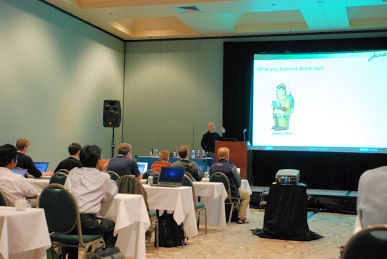(Note – this is part of a series of posts on Jazz-related activities @ EclipseCon 2008. See this entry for background.)
Presenter: Kai-Uwe Maetzel (Jazz Process Lead)
Talk: “What if your tools knew your team?”
Reporter: Jim des Rivières

Kai set the stage by telling 4 stories from everyday life that each tell us something about collaboration. Underlying any collaboration is a set of rules and patterns, with certain key characteristics. They are generally goal-specific. They may be agreed upon up front, or emerge over time. They evolve over time based on feedback. They incorporate situational sub-patterns and rules that bring in time-sensitive dimension. And they range from generic to actor-specific. The set of rules and patterns underlying any collaboration serve to make the collaborators predictable to each other, allowing the parties to effectively coordinate their actions towards a common goal.
Jazz is taking the next step in making software development tools smarter and more helpful. By making explicit the collaborative rules and patterns that teams follow, the tools are in a position to be more helpful. Analogy: the refactoring support in JDT leads to productivity gains by taking away some of the manual code editing burden, thereby freeing the programmer to worry about more important things. The collaboration support in Jazz does the same sort of thing, helping the programmer to collaborate effectively with their team while reducing the manual effort of following the teams rules and patterns.
In Jazz, the support for collaboration rules and patterns are collectively referred to as “process”. Process support is a fundamental part of the Jazz Platform kernel. It provides full-fledged process enactment, where the system is able not only to guide and advise, but also to enforce defined rules when required. The process is “live”; changing the process immediately changes the system’s behavior. And while the Jazz team happens to subscribe to many agile practices, the Jazz Platform itself is process-neutral, allowing the system to honor the diversity of other development teams and their processes.
Kai then gave a demo of Jazz and showed the ways in which the system’s process-awareness subtly permeates many aspects of how things get presented at the UI, and informs how the system reacts to the user’s requests. He concluded by inviting people to bring their questions to the 8pm Jazz Live session, where he’d be continuing the demo.










































































































































































 (6 votes, average: 3.83 out of 5)
(6 votes, average: 3.83 out of 5)